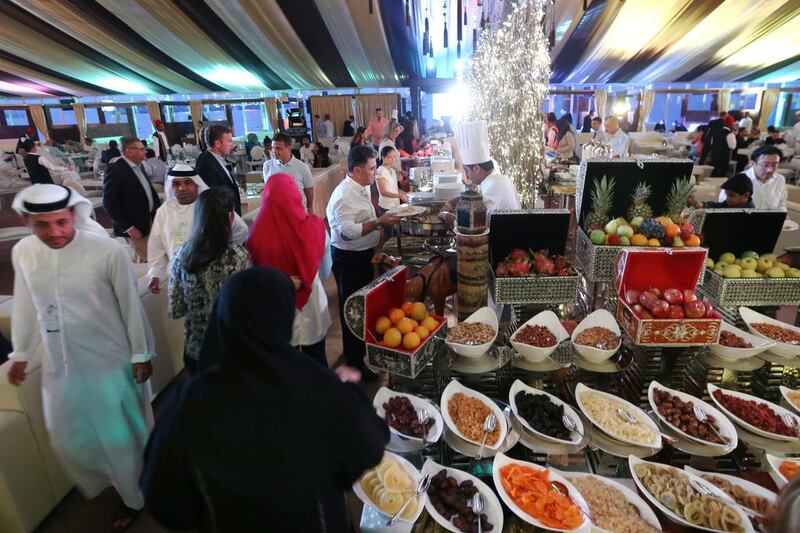ABU DHABI // Expatriates wanting to join in Ramadan celebrations are being reminded to avoid wearing revealing clothing when attending iftars.
Hotel managers are warning that guests could be turned away if dressed in tight, short or see-through clothing.
“During Ramadan, we intend to uphold the authenticity and traditions of Ramadan,” said Holger Schroth, the general manager of Emirates Palace.
“A key part of creating the perfect ambience in our Ramadan pavilion is adhering and respecting the accepted dress code during the holy month.
“In respect of local culture, kindly note that dress code standards will be strictly enforced throughout Ramadan, including in the Ramadan tent.”
The luxury hotel has turned away guests in previous years for wearing immodest dress or beachwear that is not respectful of the holy month.
“Kindly refrain from wearing revealing, translucent and tight clothing throughout the holy month,” said Mr Schroth.
“Shoulders and legs must be covered at all times and flip-flops are not allowed.”
Mohamed El Aghoury, cluster general manager of Meydan Hotels and Hospitality, echoed the sentiment. Guests need to respect traditional Islamic culture, he said.
“During Ramadan, we encourage the guests to dress in a decent and unrevealing style,” Mr El Aghoury said. “Clothing that is tightfitting or too short, such as shorts and miniskirts, are among the list of non-recommended attire for iftar tents.
“We are advising all our guests to follow these important guidelines as a show of respect and modesty for the holy month.”
Kifah bin Hussein, hotel manager at the Grand Hyatt Dubai, said male and female guests need to be modestly dressed.
“We find it very important that everyone should be able to attend our Ramadan celebrations in harmony and with this we do ask guests to be mindful of others,” he said.
“When this relates to the topic of dress code, we mean that there should be no surprises and people should dress in a modest fashion.
“We wish for a good spirit during this special time of the year and my recommendation to anyone doubtful of appropriate etiquette is just to play it safe and avoid wearing revealing garments.”
Thomas Guss, general manager of the Shangri-La Qaryat Al Beri hotel in Abu Dhabi, said that while hotel employees had not experienced any problems with guests dressing immodestly in the past they ask visitors to be mindful of the country’s traditions.
“We make a special effort to educate our guests on the customs during Ramadan and this has always been appreciated by our guests and residents,” he said.
Dr Issam Badaoui, medical director at International SOS, an organisation that helps people working abroad avoid risks to their welfare, said as a general rule shoulders and legs should be covered.
“Ramadan is a time of devoutness, modesty and moderation,” he said. “Refrain from wearing revealing clothing out of respect to those observing Ramadan.
“This is particularly important when visiting malls, hotels and restaurants or iftar tents in the evening. As a general rule, clothing that is sheer, too short, low-cut or tightfitting should be avoided, particularly shorts, miniskirts and sleeveless tops.”
jbell@thenational.ae






